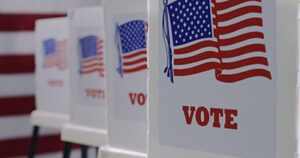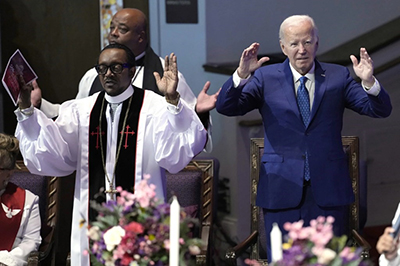Abortion has remained a fractious issue across Black Protestant churches
(Source the grio):
WASHINGTON (AP) — Phoenix pastor the Rev. Warren H. Stewart Sr. has had countless discussions this election season with fellow Black men on the economy, criminal justice, immigration and other issues dominating the political landscape in their battleground state of Arizona. But never abortion.

“They’re about justice. They’re about Donald Trump potentially reversing all of the gains achieved by the Civil Rights movement. They are not about abortion,” said Stewart.
It’s in stark contrast to what’s being said on the campaign trail, where President Joe Biden and Vice President Kamala Harris are wooing voters who support abortion rights, while Trump and his surrogates pursue anti-abortion voters.
Although Black men traditionally back Democrats, one prevailing narrative is they are unenthusiastic about Biden, the presumptive party nominee. They make up close to 7% of the electorate, according to a Pew Research Center analysis, and this year, a few thousand votes in Arizona, Pennsylvania and other swing states could decide the race.
Democratic U.S. Rep. James Clyburn of South Carolina remains concerned that Trumps’ hyper masculine-campaign style is drawing those Black male voters who don’t feel represented in mainstream politics away from the Democratic Party. Clyburn is trying to counter that trend.
After his dismal debate performance enflamed concerns about his age, Biden, 81, also is trying to shore up his loyal base. He recently appeared at Mount Airy Church of God in Christ in Philadelphia and elsewhere in the state to quell lingering questions and rumors.
“I, honest to God, have never been more optimistic about America’s future if we stick together,” said Biden, addressing the congregation in a short speech that evoked Harris but did not mention abortion rights.
Among Black clergy, few are better positioned to assess Biden’s character and fitness than Bishop Reginald T. Jackson.
The 132nd Bishop of the African Methodist Episcopal Church, Jackson, 70, was an advance man on Biden’s first campaign for U.S Senate in 1972, first getting an up-close view of the candidate’s shortcomings as a student at Delaware State University.
“All this stuttering? That ain’t nothing new,” Jackson said from his home in Atlanta.
Jackson said Biden’s recent flubs during the debate and subsequent news conferences shouldn’t stop him from touting his record of support for historically Black colleges and his administration’s advocacy for minority-owned small businesses.
“It’s almost as if the items the president has accomplished are being held like some sort of state secret,” Jackson said.
On abortion, Jackson believes the federal government shouldn’t meddle in a decision best left to a woman and her doctor, and says he is satisfied with the Biden campaign’s handling of the issue.
Over the past half-century, abortion has remained a fractious issue across Black Protestant churches, fraught with questions about sexuality and gender that their Christian community has struggled with historically.
In interviews, Black church leaders acknowledged that the church has not always been adept at talking about human sexuality, a characteristic they share with their mainstream Protestant counterparts. In “Moral Combat: How Sex Divided American Christians and Fractured American Politics,” author R. Marie Griffith, a humanities professor at Washington University in St. Louis, argues that the wariness to discuss sex — and contend with their deep-seated views on female sexuality specifically — is at the heart of many of the most divisive political issues.
One Black male pastor in particular, Democratic U.S. Sen. Raphael Warnock of Georgia, senior pastor of Atlanta’s Ebenezer Baptist Church, has been outspoken about his support for abortion access, especially during his 2022 re-election campaign.
But Warren Stewart, who leads First Institutional Baptist Church in Phoenix, wishes Biden and Harris weren’t talking about abortion so much, even as he acknowledged the Supreme Court’s decision to overturn Roe as a “political gift.” He believes abortion should be legal only in cases where the life of the individual giving birth is in danger.
Others disagree. The Rev. Leslie D. Callahan, the first woman to pastor Philadelphia’s historic St. Paul’s Baptist Church, said all men regardless of race need to decide what functions of their bodies they’d like controlled by the federal government. Black women have the highest maternal mortality rate in the US, according to the CDC’s 2022 report.
“Without bodily autonomy, what freedom do you really have?” she said.
She pointed out that Biden, who supports protecting access to abortion, isn’t being called to resign from the presidency — just the campaign.
“If he’s fit to govern, I don’t quite understand why he’s not fit to run,” Callahan said. “If you’re going to scrutinize Biden, let’s scrutinize his presidency and his policies. If you’re going to scrutinize fitness, then there needs to be consistent and equal scrutiny around the fitness of his opponent.”
As Trump tries to court Black voters, about 7 in 10 Black adults continue to have broadly negative views of him, according to an AP analysis of two consecutive polls conducted in June by the AP-NORC Center for Public Affairs Research. However, that number is down 20 percentage points since early 2021.
Although the Trump campaign has said Black men may be more receptive to his message, Black men and women have similar views of him.
Black men’s opinion of Biden also isn’t overwhelmingly positive. The poll analysis found that about half of Black men have a somewhat or very favorable view of Biden — compared to about 7 in 10 Black women — and about 4 in 10 Black men see the president negatively.
The Rev. Otis Moss Jr., pastor emeritus of the Olivet Institutional Baptist Church in Cleveland, one of the largest and best-known Black churches in Ohio, is disturbed by Trump’s positions, saying the former president cares about preserving life before birth — but not after.
“The human rights of the woman, the female, should not be infringed upon by someone else’s political ideology,” Moss said.
Vice President Harris, a member of Third Baptist Church in San Francisco, addressed religious beliefs during her March visit to a Planned Parenthood clinic in Minnesota — the first-ever toured by a sitting president or vice president.
“One does not have to abandon their faith or deeply held beliefs to agree that the government should not be telling women what to do with their body,” Harris said.
“If she chooses, she will consult with her priest, her pastor, rabbi, her imam. But is that for the government to tell her what she can and cannot do with her own body?”

